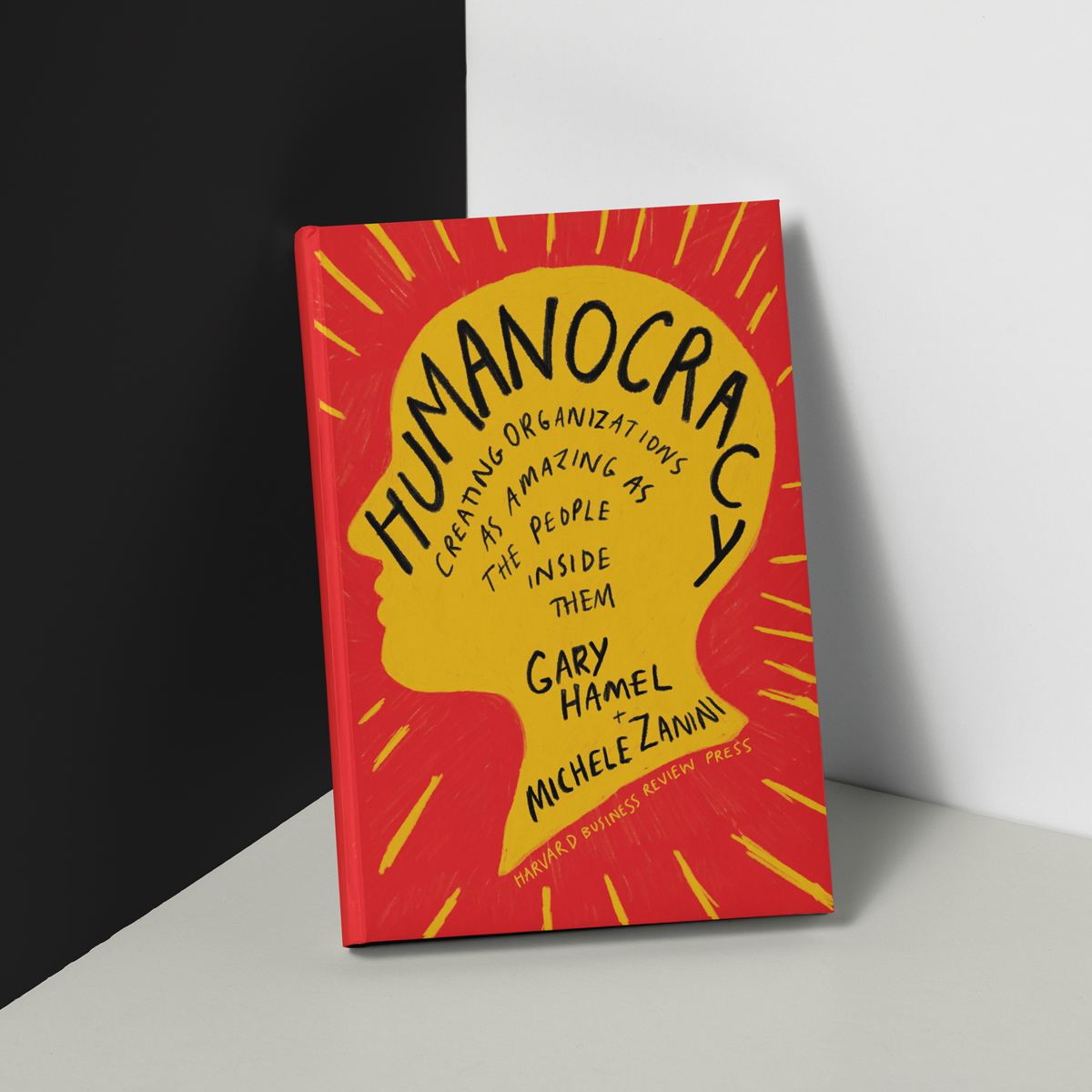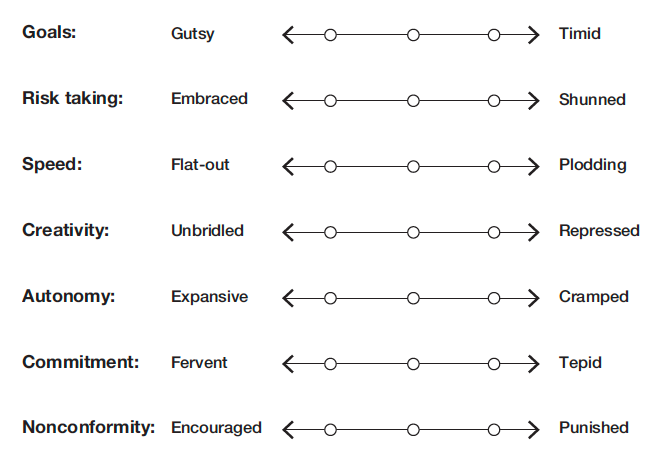Fully Human: An Excerpt from Humanocracy
This is a brief excerpt from Humanocracy. We hope this preview will inspire you to join a cause that has never been pressing: building organizations that are fit for the future--and for human beings.

Over the last few years, my colleague Gary Hamel and I have been blessed with the opportunity to work with an amazing band of organizational buccaneers. They’ve taught us that with courage, compassion, and contrarian thinking, anyone can transform a large organization—whatever their title or position.
Our new book, Humanocracy: Creating Organizations as Amazing as the People Inside Them, is a manifesto and a manual to incite that transformation. It argues, persuasively we hope, that it’s time to free the human spirit from the shackles of bureaucracy— and that doing so will produce profound benefits for individuals, organizations, economies, and societies. It also gives management renegades practical strategies for advancing the cause of humanocracy within their own organizations.
Below is a brief excerpt from Humanocracy. We hope this preview will inspire you to join a cause that has never been pressing: building organizations that are fit for the future--and for human beings.
We are defined by the causes we serve. Our identity is discovered in the challenges we embrace. However modest our means and finite our capabilities, we can gift ourselves the exhilaration of a noble quest. Thankfully, there are plenty of deserving problems to go around—like building machines that think, reducing CO2 emissions, overcoming racial disharmony, combating drug-resistant superbugs, ending human trafficking, and building habitats on other planets.
At some deep level, we know that life is too short to work on inconsequential problems. We know the sages were right when they commended “the road less traveled.” Solving new problems and forging new paths—this is what we were born to do. It’s tragic, then, that so many of us work in organizations that are fainthearted and dispiriting. Suggest an unprecedented and audacious idea to your boss and you’re likely to get pummeled with objections: “That doesn’t fit our strategy.” “We don’t have the budget.” “You’ll never get it past legal.” “That’s not our culture.” “It’s impractical.” “There’s a lot of downside.” The problem isn’t your manager, who’s just as hamstrung as you are. The problem is that your organization, like most, is inherently hidebound, repressive, and fainthearted.
Take a moment and score your organization on the following dimensions:

Unless your organization is pint-sized or truly exceptional, it probably tilts to the right side of the scale. That’s why you feel beleaguered. You’ve had the bold beaten out of you. “Epic quest,” you snort. “I’m just trying to make the quarter.”
Fair enough, but how did we end up with organizations so lacking in courage, creativity, and passion? And, as importantly, how did we become inured to this reality? The simple answer: it’s all we’ve ever known. To one degree or another, every organization is diffident and dogmatic. Even world-beating companies seem burdened with intrinsic inadequacies.
Take Intel. You need thousands of wickedly smart people to pack 100 million transistors onto a square millimeter of silicon. Yet as a company, Intel botched what should have been a no-brainer: supplying chips for billions of mobile devices. Having failed to anticipate the explosive growth in the market for smartphones, Intel spent a decade, and more than $10 billion, trying to get back in the game. Finally, in 2016, it admitted defeat and shuttered its mobile communications unit. Other titans of tech—Microsoft, IBM, Hewlett-Packard, and Dell Technologies—similarly bungled the mobile revolution. How did this happen? How do companies with billion-dollar R&D programs, celebrity CEOs, and access to the best consultants in the world fluff the future?
Make no mistake, in many ways our organizations exceed us. Tour Tesla’s manufacturing facility in Fremont, California, and you’ll be awestruck. At more than 5 million square feet, it’s the state’s largest building. Hundreds of giant robots execute complex, ballet-like movements, driverless carts shuttle parts between workstations, giant hoists twirl car frames through the air, a seven-story press slams out body panels, and a hive of workers race to keep everything running smoothly. This symphony of synchronicity is, quite simply, beautiful. One can’t help but be impressed by what human beings can accomplish when they work in concert.
Our organizations allow us to do together what can’t be done alone. No single human can build a car, launch a satellite, create an operating system, train a doctor, erect a building, or mobilize a movement. Even Jesus needed twelve disciples.
Yet for all their accomplishments, our organizations are inertial, incremental, and uninspiring. These are the core incompetencies of the corporation, and they’re so pervasive that we can be forgiven for assuming they’re irremediable. We tell ourselves it’s the nature of large organizations to be brittle and backward-looking, and to wish it otherwise is naive. Our pessimism would be justified except for one salient fact. As human beings, we are resilient, inventive, and exuberant. The fact that our organizations are not suggests that in some important ways, they are less human than we are. Ironically, it seems that human-built organizations have scant room for exactly those things that make us furless bipeds special—things like courage, intuition, love, playfulness, and artistry. We can’t blame malevolent gods for this lamentable fact. If our organizations are inhuman, it’s because we designed them to be so—whether consciously or not. Every institution is an assemblage of choices about how best to organize human beings in light of some particular goal. The premise of this book is that most of these choices can and must be revisited.
We shouldn’t have to content ourselves with organizations that are authoritarian and joyless. Legacy is not destiny. There was a time when most of the world was ruled by tyrants, but today, billions of human beings live in freedom. This shift from autocracy to democracy didn’t occur spontaneously, nor was it led from the top. Instead, it was the work of a sprawling confederation of philosophers, protesters, and patriots who were inspired by the promise of self-government.
We must be no less radical in rethinking the foundations of human organizations. Like our forebears, we must do our part to emancipate the human spirit. It is here we find a cause worth serving—to build organizations that give every human being the opportunity to thrive.
If you believe that human beings deserve more from their jobs, and that we’d be better served by more dynamic and inventive institutions, there’s a ton you can do to move the world forward. As we’ll see, there are compelling, workable alternatives to the organizational status quo, and a way to get from here to there—though it’ll take some bushwhacking. Have no doubt, if you start with the right principles and learn to think like an activist, you can make a decisive contribution to enriching the lives of your colleagues, and to helping your organization flourish in a world that, however unsettling, is awash in opportunity.
As we set off, we should remind ourselves that when we regard a problem as intractable, we conspire to perpetuate it. Think of the well-off urbanite who averts his eyes from the homeless rather than volunteering at a shelter, or the beachgoer who picks her way through a scattering of plastic waste but doesn’t stoop to pick it up. However daunting, even the most entrenched problems yield to courage and tenacity. We must not flinch or look away. Instead, we must confront what we have long known—our organizations are incapacitated by their inhumanity. We’ll document this reality in the remainder of chapter 1, diagnose root causes in chapter 2, and build the case for a management revolution in chapter 3. In subsequent chapters, we’ll lay out a blueprint for building organizations that are fully human and fully capable.
